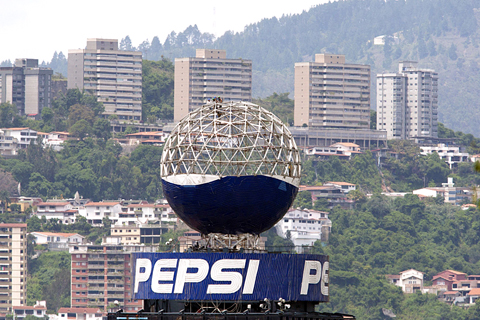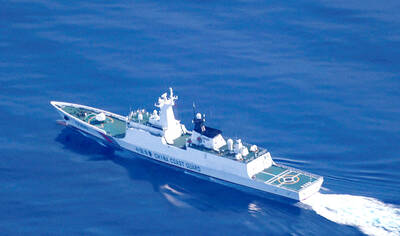Mountains of rotting food found at a government warehouse, soaring prices and soldiers raiding wholesalers accused of hoarding: Food supply is the latest battle in Venezuelan President Hugo Chavez’s socialist revolution.
Venezuelan army soldiers swept through the working class, pro-Chavez neighborhood of Catia in Caracas last week, seizing 120 tonnes of rice along with coffee and powdered milk that officials said was to be sold above regulated prices.
“The battle for food is a matter of national security,” said a red-shirted official from the Food Ministry, resting his arm on a pallet laden with bags of coffee.

PHOTO: REUTERS
It is also the latest issue to divide the Latin American country where Chavez has nationalized a wide swathe of the economy, he says to reverse years of exploitation of the poor.
Chavez supporters are grateful for a network of cheap state-run supermarkets and they say the raids will slow massive inflation.
Critics accuse him of steering the country toward a communist dictatorship and say he is destroying the private sector.
They point to 80,000 tonnes of rotting food found in warehouses belonging to the government as evidence the state is a poor and corrupt administrator.
Jose Guzman, an assistant manager at a store raided in Catia, watched with resignation as government agents pored over the company’s accounts and computers after the food ministry official and the television cameras left.
“The government is pushing this type of establishment toward bankruptcy,” said Guzman, who linked the raid to the rotten food scandal.
“Somehow they have to replace all the food that was lost, and this is the most expeditious way,” he said.
Much of the wasted food, including powdered milk and meat, was found last month in the buildup to legislative elections in September. The scandal is humiliating for Chavez, who accuses wealthy elites of fueling inflation and causing shortages of products such as meat, sugar and milk by hoarding food.
“They are not going to stop us in the plan, which is to give the people what is their right,” Chavez said on Friday, during the inauguration of a supermarket chain the government bought this year from French retailer Casino.
Figures show food prices have risen 41 percent in the last 12 months during a deep recession, despite the government’s growing network of state-run supermarkets that sell at discounts of up to 40 percent and are popular with his poor supporters.
South America’s top oil exporter, Venezuela imports about 70 percent of its food and analysts say the economic hardships could give the opposition a boost at the ballot box — although most expect Chavez to retain a reduced parliamentary majority.
Fighting back, Chavez says he is in an economic war against the “parasitic bourgeoisie” that tries to convince Venezuelans socialism does not work, by twisting facts and taking advantage of honest mistakes.
“They know where we are headed, we are going to take from the Venezuela bourgeoisie the hegemony of dominance in this country,” Chavez, who calls himself a Marxist, said to applause from supporters on his TV show last Sunday.
He has also revived threats to take over the country’s largest private food processor, miller and brewer, Polar.
The president rushed to support Oil Minister Rafael Ramirez, who as the boss of PDVSA is also responsible for food unit PDVAL, over the case of the rotting food.
Two former PDVAL managers have been jailed in the scandal, but that has not stifled opposition charges of government incompetence.
A string of expropriations and buyouts of companies during the last couple of years means the government now controls between 20 percent and 30 percent of the distribution of staple foods.
“We are bringing order to prices,” Trade Minister Richard Canan said during the Catia raid. “There are traders who are taking these products to the black market ... That is a crime and our government will continue to target these stores.”

LANDMARK CASE: ‘Every night we were dragged to US soldiers and sexually abused. Every week we were forced to undergo venereal disease tests,’ a victim said More than 100 South Korean women who were forced to work as prostitutes for US soldiers stationed in the country have filed a landmark lawsuit accusing Washington of abuse, their lawyers said yesterday. Historians and activists say tens of thousands of South Korean women worked for state-sanctioned brothels from the 1950s to 1980s, serving US troops stationed in country to protect the South from North Korea. In 2022, South Korea’s top court ruled that the government had illegally “established, managed and operated” such brothels for the US military, ordering it to pay about 120 plaintiffs compensation. Last week, 117 victims

‘HYANGDO’: A South Korean lawmaker said there was no credible evidence to support rumors that Kim Jong-un has a son with a disability or who is studying abroad South Korea’s spy agency yesterday said that North Korean leader Kim Jong-un’s daughter, Kim Ju-ae, who last week accompanied him on a high-profile visit to Beijing, is understood to be his recognized successor. The teenager drew global attention when she made her first official overseas trip with her father, as he met with Chinese President Xi Jinping (習近平) and Russian President Vladimir Putin. Analysts have long seen her as Kim’s likely successor, although some have suggested she has an older brother who is being secretly groomed as the next leader. The South Korean National Intelligence Service (NIS) “assesses that she [Kim Ju-ae]

In the week before his fatal shooting, right-wing US political activist Charlie Kirk cheered the boom of conservative young men in South Korea and warned about a “globalist menace” in Tokyo on his first speaking tour of Asia. Kirk, 31, who helped amplify US President Donald Trump’s agenda to young voters with often inflammatory rhetoric focused on issues such as gender and immigration, was shot in the neck on Wednesday at a speaking event at a Utah university. In Seoul on Friday last week, he spoke about how he “brought Trump to victory,” while addressing Build Up Korea 2025, a conservative conference

China has approved the creation of a national nature reserve at the disputed Scarborough Shoal (Huangyan Island, 黃岩島), claimed by Taiwan and the Philippines, the government said yesterday, as Beijing moves to reinforce its territorial claims in the contested region. A notice posted online by the Chinese State Council said that details about the area and size of the project would be released separately by the Chinese National Forestry and Grassland Administration. “The building of the Huangyan Island National Nature Reserve is an important guarantee for maintaining the diversity, stability and sustainability of the natural ecosystem of Huangyan Island,” the notice said. Scarborough